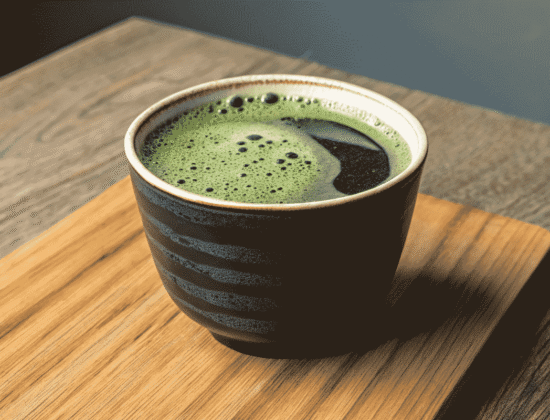If you’ve ever had traditional matcha, you know it’s all about that vibrant green color, grassy flavor, and creamy, frothy texture. But now there’s a new twist on this ancient drink: black matcha.
Despite the name, black matcha isn’t just matcha dyed a different color. It’s something entirely new, made from fermented and roasted tea leaves. It’s a bold, flavorful alternative for those who want the depth of black tea with the silky texture of matcha.
What Is Black Matcha?
Unlike green matcha, which is made from shade-grown green tea leaves that are steamed and stone-ground, black matcha is made from black tea leaves that are roasted and stone-ground. These leaves go through a complete oxidation process (just like your favorite English Breakfast or Darjeeling), and then they are milled into a fine powder.
The result? A dark, cocoa-colored powder with a much richer, more malty flavor than green matcha. Instead of tasting fresh and grassy, black matcha brings bold notes of chocolate, spice, and toasted grains. Some even say it has a slightly sweet or molasses-like quality.
It’s prepared the same way as traditional matcha—just whisk it into hot water until frothy. But the taste and color are entirely different, giving tea lovers a new reason to reach for the chasen (bamboo whisk).
How to Use Black Matcha
Just like green matcha, black matcha is incredibly versatile. You can:
- Whisk it with hot water for a bold cup of tea
- Blend it into lattes with milk or plant-based milk
- Add it to smoothies, oatmeal, or baked goods for a roasted twist
- Mix it into chocolate desserts for an extra malty kick
Because it’s finely ground, black matcha is also higher in caffeine than steeped black tea, making it great for an energy boost without the harsh bitterness of coffee.
Health and Environmental Benefits
According to Wild Orchard Tea, their version of black matcha is made from regeneratively grown tea leaves, meaning it’s cultivated in a way that restores soil health and improves biodiversity. That’s a win not just for your body but for the planet, too.
As for nutrition, black matcha still retains antioxidants—though not the same kind as green matcha—and provides L-theanine, the calming amino acid that pairs well with caffeine.
Where to Buy It
Black matcha is still relatively niche, but it can be found at specialty tea retailers. For example:
- Tea Grotto offers a smooth, full-bodied version ideal for lattes
- Wild Orchard produces a regeneratively grown black matcha with rich, caramel notes
As with all matcha, freshness and sourcing matter—so look for trusted brands with clear information on origin and production.
Final Thoughts
Black matcha is more than a trend—it’s a clever reimagining of traditional matcha for people who want the richness of black tea with the artistry of Japanese tea culture. Whether you’re a longtime tea lover or just looking for something new, this bold powder deserves a place in your cup.


